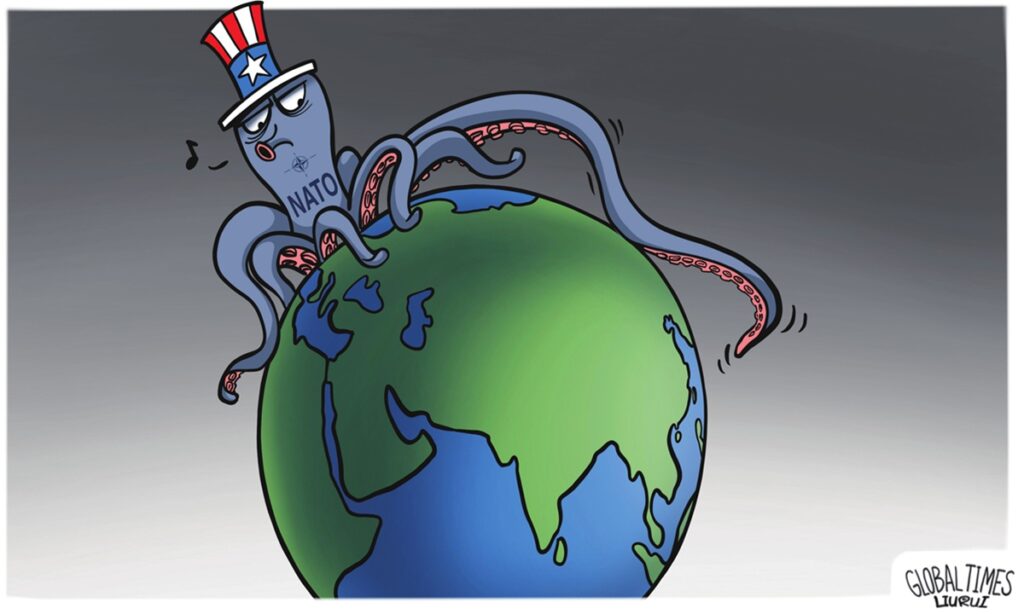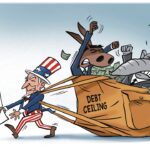Former British prime minister Liz Truss called for the creation of an “economic NATO” to coordinate pushback against China’s economic power when delivering a keynote speech in the island of Taiwan on Wednesday, according to The Guardian.
Not long ago, two former senior NATO officials made a similar proposal to create an “Economic Article 5” to counter so-called authoritarian coercion. One is the former NATO secretary-general, Anders Fogh Rasmussen, and the other is Ivo Daalder, the former US ambassador to NATO. Such a proposal reeks of rotten imperial hegemony.
The danger of an “Economic NATO” is that it is encouraging countries that maliciously impinge on China’s red lines of core interests and tying all member countries to a chariot that is rushing to engage in economic warfare with China.
New terms for various derivatives of NATO have surfaced for some time, such as the “economic NATO,” “Asian NATO,” and “Indo-Pacific NATO,” and the discussions are still simmering.
No matter what they are called, they expose a major risk in the world today, that is, the Western group, led by the US, is stepping up political manipulation based on ideological values and accelerating the push for a new Cold War across the globe. And since the US, shackled to a Cold War mentality and ideological prejudice, wants to paint China as an economic and political threat to the West, encircling and containing China on both the political and economic levels has become a priority direction.
What NATO has been instigating in the Asia-Pacific also points to the attempt to encourage member states to challenge China’s core interests by provoking the one-China principle. Taiwan is an inalienable part of China’s territory. China’s position on the Taiwan question is consistent and clear. And all NATO members accept the principle, which is the cornerstone of their diplomatic and economic relations with China.
Anyone who attempts to cross the red line of China’s core interests will be met with due retaliation. Today’s China is not the same as it was during the Opium War more than 100 years ago.
It needs to be pointed out that the essence of NATO’s expansion to the economic sphere is an apparent attempt to weaponize economic issues. NATO itself is a military alliance with plenty of political-military instruments at its disposal. And their tendency to use economic tools as weapons against others is obvious.
While the NATO still describes itself as a global security alliance in which member countries agree to help one another in terms of the defense mechanism, it has been trying to exploit opportunities to make itself evolve into a military organization with global intervention capabilities. It is on the basis of this change that the NATO has turned its eye to economic weapons. While Western sanctions against Russia were not primarily coordinated under the NATO mechanism, it is highly possible that the NATO will improve its coordination capabilities in terms of economic intervention in the next step.
Yet, the attempt to trigger a new Cold War against China is doomed to be unpopular. NATO is the product of the Cold War in the past, and it is highly questionable whether the Asian economies and even most of NATO’s European members are willing to be trapped in a new economic Cold War, which could risk their economic future. China is already the No. 1 trading partner for economies in the Asia-Pacific region, and has close economic ties with all members of NATO. Most European members of NATO don’t think “decoupling” from China is a viable option. And most importantly, they are willing to respect each other’s core interests with China.
Under such circumstances, the idea of an “economic NATO” is nothing more than political gimmick, and it would be laughable if any country will really fall for it. The minds of those who want to increase the economic crackdown to force China to accept harm to its core interests are still stuck in the last century.
(Global Times)




